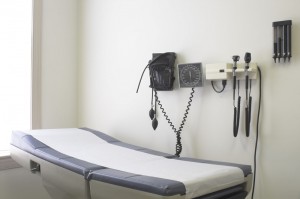The End of Polite Conversation? Part Two
 Image credit: robeo / 123RF Stock Photo
Image credit: robeo / 123RF Stock Photo This is the conclusion of a two-part series. Click here to read part one.
And then I came to my third visit, where he told me I should get an award for my eighteen-year marriage. Receiving no response from me aside from a wary, uncertain smile, he continued on: “I see so many patients in here, on their second or third marriages, or just living with somebody. I don’t want to hear about that. What I’m really mad about is the Supreme Court… what I’m really getting at here is the gays.”
My jaw started to clench, this being the current locus of my stress, which used to be part of my sleep troubles until I saw my new dentist who made me a fancy splint. My new dentist doesn’t mix politics with medicine. I like him.
The sleep doctor continued, more animated now, my sleep chart (on which I’d meticulously mapped out my nocturnal life) completely forgotten. “What I’m talking about,” he said, his voice rising, “is that if your kid goes to public school, he’ll have ‘gay day.’ What I’m talking about is how we live in a culture that celebrates what’s wrong.”
To be confronted with these inappropriate comments, by a virtual stranger and in such a private space, shook me. After all, a doctor’s office is a space reeking with vulnerability. The expectations of trust are high. You may very well be naked under a thin cotton gown, the backs of your legs sticking to a piece of crinkly white paper. Later, when telling this story to a friend, she recounted a recent visit to her male gynecologist during which he began ripping Obamacare—with his fingers firmly pressed against her cervix. Talk about vulnerability. “What was I supposed to say,” she lamented, “in that position?”
At the sleep doctor’s, I was dressed, but felt bare, as though he could read the level of disgust that must be on my face, and yet, he couldn’t. He didn’t, clearly. He thought I was just like him. He thought, simply because I seemed like a nice, heterosexual, long-time married woman with two kids that I simply must be just like him ideologically. I glanced toward the closed door, wondering how to navigate my escape.
“We’re not talking about this,” I heard myself say, not sure if it was in my head or out loud. It was out loud, I judged, by his quizzical expression. “Let’s talk about my sleep issues, okay? I’m here for help with my sleep problems.”
He took a deep breath and said, “Oh, yes, you’re right,” winking at what he inexplicably thought was my agreement with him, “because we could be here all day talking about this!” (“This” being the degradation of “our” culture, by homosexuals and the people who love them, know them, and consider them human beings.)
“No,” I said quietly, “because I disagree with you.”
His eyes clouded with confusion. He quickly looked back at my chart then conducted a terse summary of what we’d covered, and we discussed when I should come back for a follow-up. I wouldn’t be back, but I didn’t tell him that. He’d know when he saw the cancelled appointment.
Later, a friend said I’d been brave. I laughed loudly. I felt like a coward. When I replayed the scenario in my head, I wished I’d launched into a whole speech on equality, wished I’d grabbed him by the collar, pulled him out of his chair, and shook him, sending his little wire-rimmed glasses flying. (He’s a small guy, and I’d been lifting weights.)
It’s the assumptions that get to me. It’s the fact that I get a free pass in our homogenous town where I’m just one of many white, married, forty-ish women driving her two blonde-haired kids to art camp. No one questions my relationships. No one knows I’ve just finished writing, from within the bedroom closet that serves as my office, a rather subversive novel, as pro-gay rights a book as there ever was. I write in a figurative closet too, and the conservatives here in my politically red town in my deeply purple state would rather I, and all the other liberals, stay in it.
But things are changing, or maybe I’m just noticing them more. The conservative voices are suddenly growing louder. Were there always this many pick-up trucks in town with confederate flag decals? Or have they multiplied since Obama? Were there always this many letters to the editor of my daily paper about the evils of homosexuality, or have they increased in response to DOMA?
Perhaps my doctor and others like him are feeling threatened by the national rise of voices that support equality, and so they’re reaching out, seeking to reassure themselves of the correctness of their beliefs by building consensus, one patient at a time. Maybe my doctor has the erroneous opinion that he’s the new minority in town. His outspoken arrogance could be a sign of something better to come, a sign that he feels the need to defend himself. And if indeed he feels that need, it starts with another voice, to defend himself against, even if it’s a small voice in his office. Maybe he went home and replayed the scenario with me in his head, wondering what he might have said differently or else feeling outraged that I challenged him. I wouldn’t feel too badly if he lost some sleep over it.
Click here to read part one of “The End of Polite Conversation”
